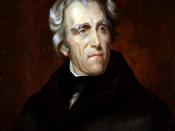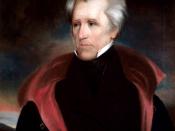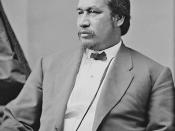Jacksonian Democracy was or was not democratic?
Jacksonian Democracy marked the age "of the common man" and the era for an improvement on government and society. When Andrew Jackson was president, he led the nation of the United States into dramatic changes both socially and politically which affected the government system and the lives of the American people positively. He fascinated the American people greatly because he stood for values they stood for such as a better government system. Because of his background as an average and ideal American and as the war hero of the Battle of New Orleans in 1815, he was able to draw support from almost every section of the U.S. and social class. Despite how democratic Jackson may seem, he appeared more tyrant-like than any of his forerunners. His major offerings to the nation included expansion of land (like Florida) and a government system that granted the common people the oppurtunity to work in the presidency (the spoils system).
However, Jacksonian Democracy was in no way democratic because it treated the Native Americans with immense cruelty, it benefited only white males, and it loathed and fought relentlessly to abolish the Bank of the United States.
The total inhumane and despicable treatment of the Native Americans proved how non-democratic Jacksonian Democracy was. An example of this was when Andrew Jackson boldly enforced the Indian Removal Act in 1830, requiring all Indian tribes including the Cherokees to move to reservations west of the Mississippi River. This act, without any doubt, was the most horrific Jackson has ever carried out. According to Chapter 13 of The American Pageant, in 1828 the Georgia legislature declared the Cherokee tribal council illegal and asserted its own jurisdiction over Indian affairs and Indian lands. The Cherokees retaliated to this by appealing this...



Thanks
This is reall good essay for my research project i apprectiae it. and i bet so do some other people who are having to do this
4 out of 4 people found this comment useful.